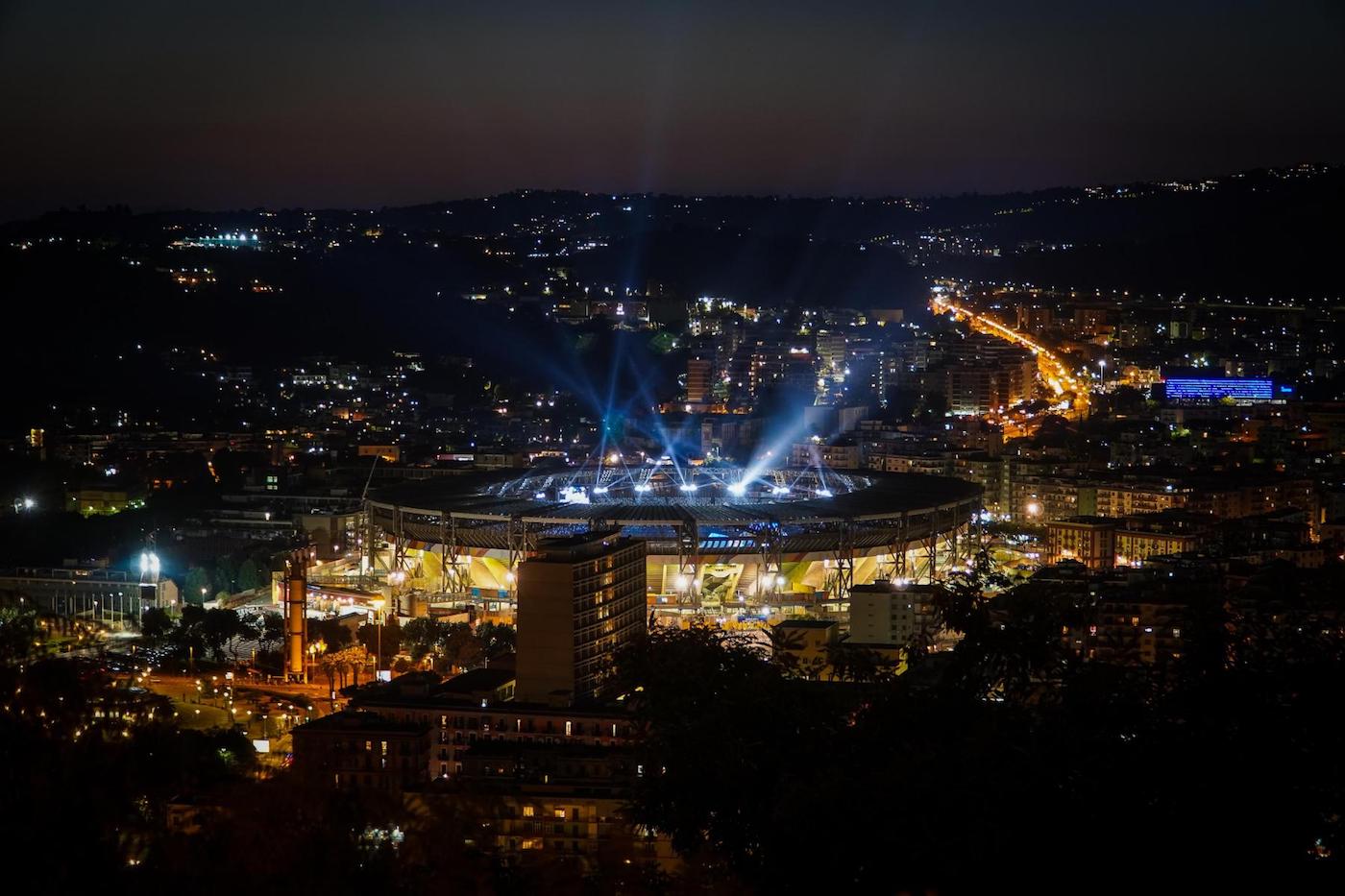 As the International University Sports Federation embarked upon 2019, the 70-year-old federation found itself at a crossroads. On the one hand, it had come a long way since the first International University Sport Week in 1949 and was celebrating seven decades of driving the university sports movement. On the other, the year marked many firsts that set the stage for a new and exciting future.
As the International University Sports Federation embarked upon 2019, the 70-year-old federation found itself at a crossroads. On the one hand, it had come a long way since the first International University Sport Week in 1949 and was celebrating seven decades of driving the university sports movement. On the other, the year marked many firsts that set the stage for a new and exciting future.
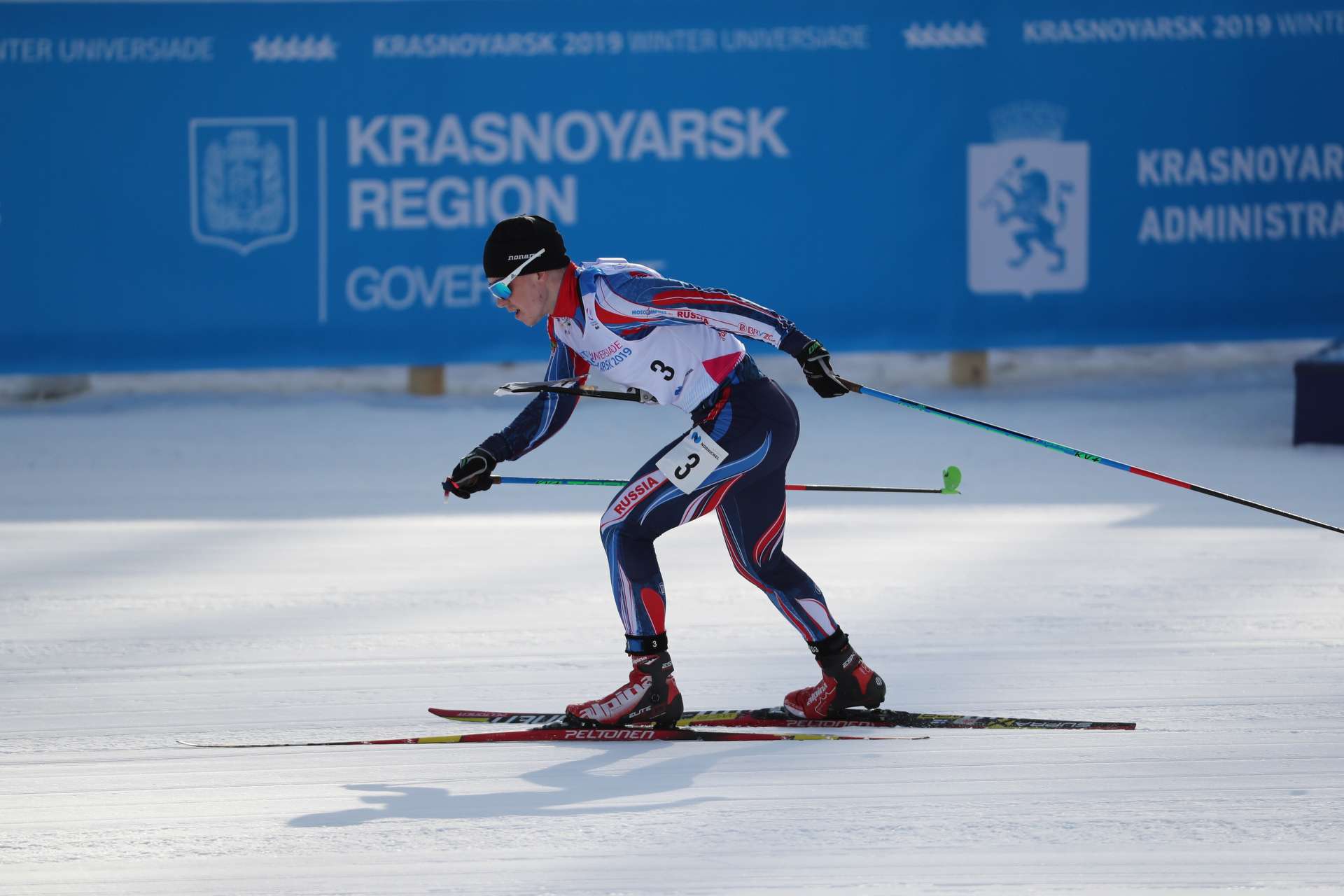 The first big FISU sports event of the year was the Krasnoyarsk 2019 Winter Universiade, which set a record of sorts with the participation of 58 countries and nearly 1,700 athletes. In Siberia, ski orienteering made its Universiade debut and the United Arab Emirates participated in the winter sport spectacle for the first time. It was also the first time ever that good wishes came from high above – as celebrated cosmonaut Oleg Kononenko spoke to the athletes from outer space during the opening ceremony.
The first big FISU sports event of the year was the Krasnoyarsk 2019 Winter Universiade, which set a record of sorts with the participation of 58 countries and nearly 1,700 athletes. In Siberia, ski orienteering made its Universiade debut and the United Arab Emirates participated in the winter sport spectacle for the first time. It was also the first time ever that good wishes came from high above – as celebrated cosmonaut Oleg Kononenko spoke to the athletes from outer space during the opening ceremony.
From the 5,000 smiling volunteers to the nearly flawless performances of some of the gold medallists, the 29th edition of the Winter Universiade will go down in history for the emotions it incited.
FISU President Oleg Matytsin evoked these passions when he thanked the Krasnoyarsk citizens by saying, “the days that we spent here, in the heart of Siberia, will always remain in our memory!”
The Krasnoyarsk 2019 legacy thrives as its venues and facilities are now open to public and are being used enthusiastically by local Siberian clubs and communities alike.
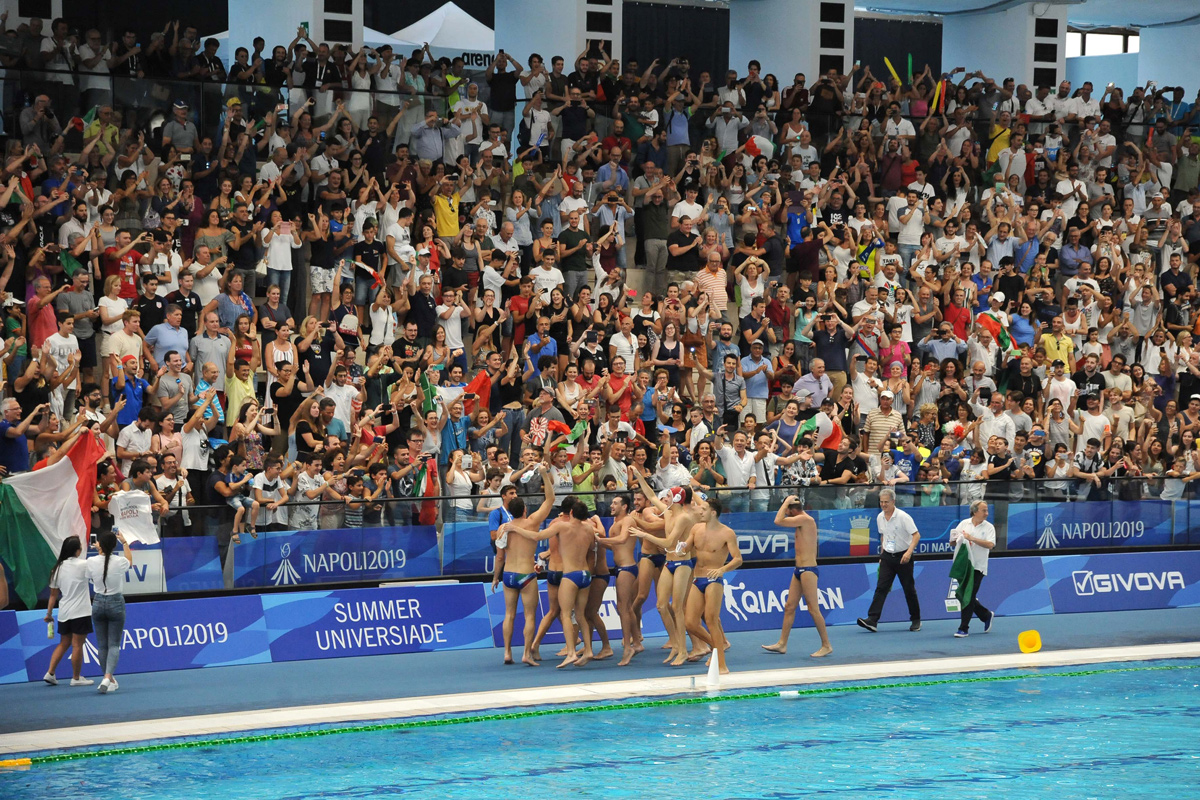 The final event of the Napoli 2019 Summer Universiade was a standing room only crowd as Italy withstood USA in the men’s waterpolo gold medal gameJust over three months later, more than 6,000 athletes representing around 120 countries marched into the Stadio San Paolo in Italy for the Napoli 2019 Summer Universiade. As per its motto, the 30th Summer Universiade was unique indeed – and not just because the Athletes’ Village was housed on two luxury cruise ships.
The final event of the Napoli 2019 Summer Universiade was a standing room only crowd as Italy withstood USA in the men’s waterpolo gold medal gameJust over three months later, more than 6,000 athletes representing around 120 countries marched into the Stadio San Paolo in Italy for the Napoli 2019 Summer Universiade. As per its motto, the 30th Summer Universiade was unique indeed – and not just because the Athletes’ Village was housed on two luxury cruise ships.
The sun-soaked seaside city gave athletes and spectators an unparalleled setting for the biggest multi-sport event for student-athletes. A lasting image from the artistic and musical opening ceremony was the spellbinding performance of arguably the best tenor in the world today – Andrea Bocelli, whose melodious voice enthralled the spectators and resonated in Stadio San Paolo as the clock struck midnight to mark the opening of the games.
Sport took centre stage in Napoli, as it should, with the moment of crowning glory coming as the home nation closed the 12 days of competition with gold in the men’s water polo final.
“It feels so very good, it was important to win in front of our supporters,” said Italy’s gold medal winning water polo captain, Umberto Esposito. “This is very emotional.”
It was a perfect emotional moment to cap off a magical fortnight.
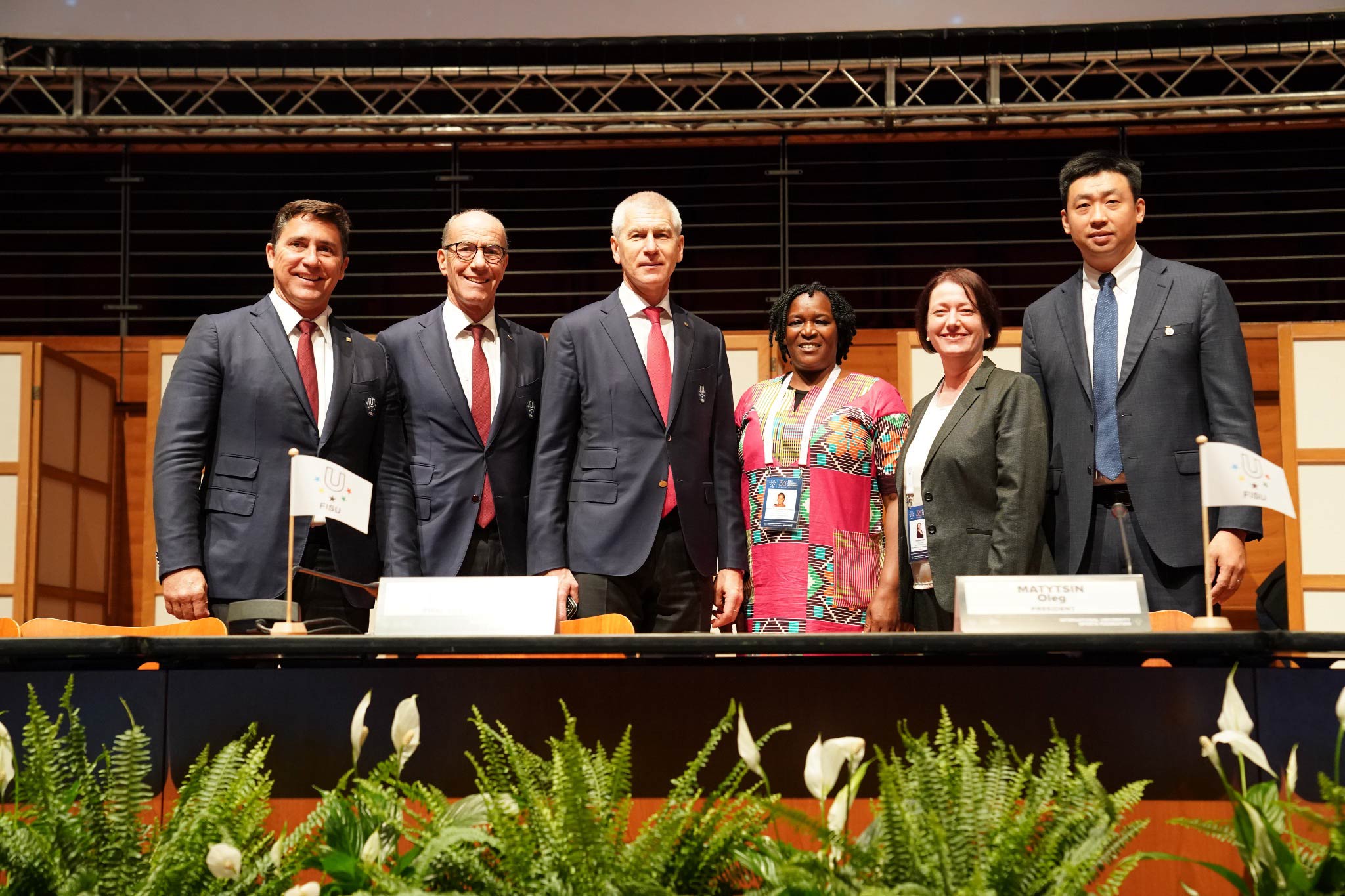 L-R: FISU VP Luciano Cabral (BRA), 1st VP Leonz Eder (SUI), President Oleg Matytsin (RUS), VP Penninah Aligawesa Kabenge (UGA), Senior EC Member Verena Burk (GER) and VP Shen Zhen (CHN)Later in the year, as FISU geared up to celebrate its 70thanniversary, it also prepared for a new era with a fresh Executive Committee that was elected during the 36th FISU General Assembly held in Turin, Italy, in November.
L-R: FISU VP Luciano Cabral (BRA), 1st VP Leonz Eder (SUI), President Oleg Matytsin (RUS), VP Penninah Aligawesa Kabenge (UGA), Senior EC Member Verena Burk (GER) and VP Shen Zhen (CHN)Later in the year, as FISU geared up to celebrate its 70thanniversary, it also prepared for a new era with a fresh Executive Committee that was elected during the 36th FISU General Assembly held in Turin, Italy, in November.
President Oleg Matytsin was once again endorsed as FISU President for a further four-year term. In a historic development, Penninah Aligawesa Kabenge from Uganda was elected as the federation’s first-ever female Vice President.
The four-year term of the Executive Committee officials elected in Turin will cover Universiades to be held in Lucerne and Chengdu in 2021 and Lake Placid and Ekaterinberg in 2023.
The FISU sporting season in 2019 closed with the two University World Cups, the unique tournaments with the university-versus-university format rather than national teams. A successful fifth edition of the FISU University World Cup 3×3 was staged in Xiamen, China. The inaugural KELME 2019 FISU University World Cup – Football soon followed in Jinjiang, also in China.
FISU’s newest sports property set the bar high as it played out from 21 November to 1 December 2019. The tournament in Jinjiang paved the way for the future of university-versus-university competition in the world’s most popular sport.
After almost a year of training, preparation and continental qualifying tournaments, more than 400 student-athletes arrived in Jinjiang to play a total of 62 matches over 11 days. Most of the teams were raring to go, to take a shot at being crowned the first-ever ‘University World Cup Champion’ in football.
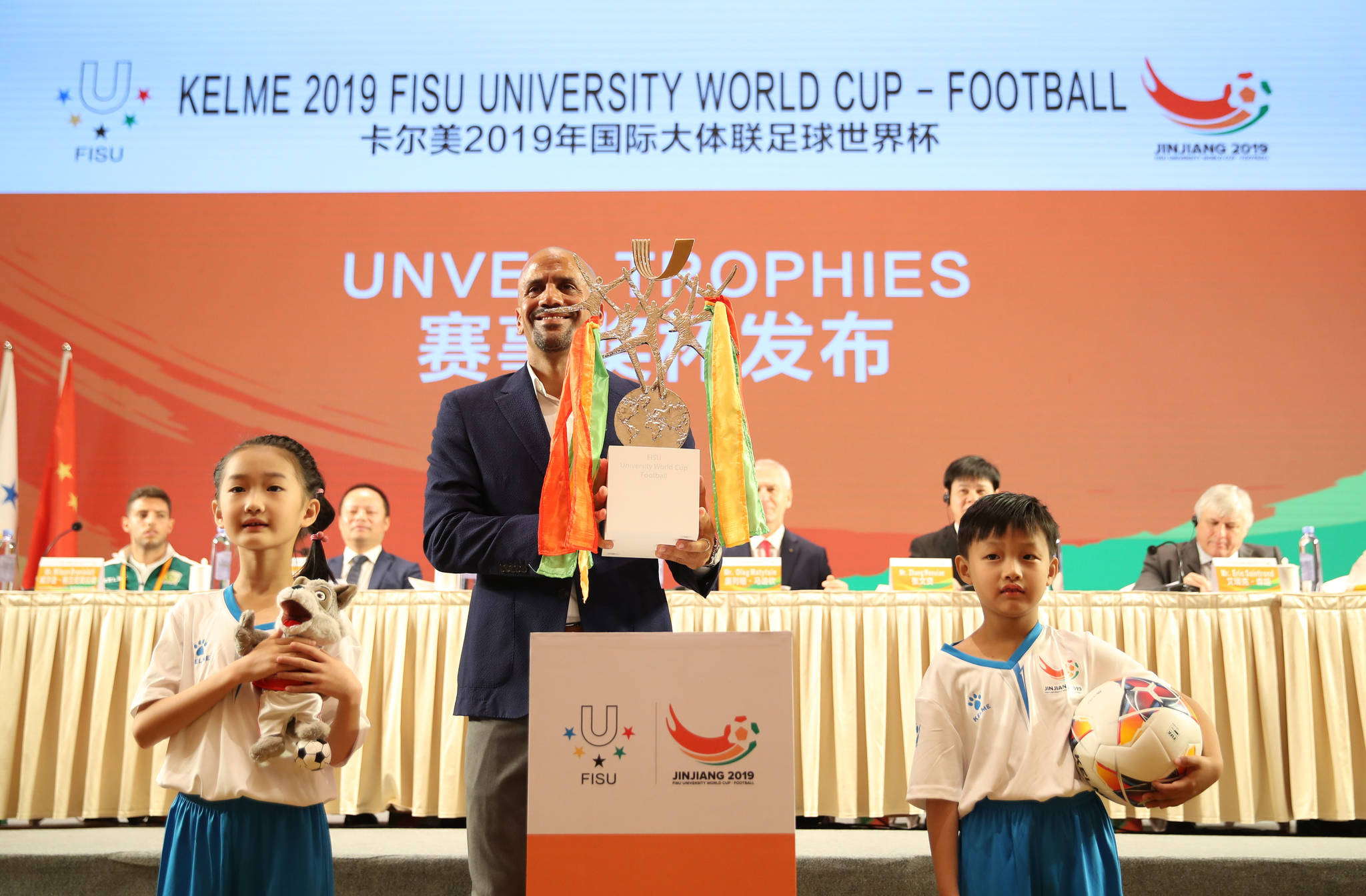 “We came to this competition to become the champions,” said Igor Milioransa of Paulista University upon his arrival in Jinjiang. “It is a great experience because for many of us it is our first time travelling outside Brazil.”
“We came to this competition to become the champions,” said Igor Milioransa of Paulista University upon his arrival in Jinjiang. “It is a great experience because for many of us it is our first time travelling outside Brazil.”
The tournament created waves even before the first kick-off as one of FIFA’s ‘125 greatest living footballers’ arrived in Jinjiang to unveil the distinctive trophy. Argentine football legend Juan Sebastián Verón gave the green signal for the games to begin and had a word of inspiration for the participating student-athletes.
As the tournament progressed, the women’s team from the University of Ottawa made news for more reasons than one. The firebrands from Canada, known as the ‘Gee-Gees’, seared their way through the draw even as they studied furiously for exams during the day.
“We have been trying to balance school and soccer while we’ve been here,” said goalkeeper Margot Annie Shore, the undisputed star of Ottawa’s semi-final victory against Beijing Normal University.
“Most of us start exams as soon as we get back, so we are all trying to keep up with our schoolwork here in Jinjiang!”
The sheer effort of keeping up with academics and reaching the final at the same time was not lost on anyone and the Canadians became immensely popular with local fans and other teams alike.
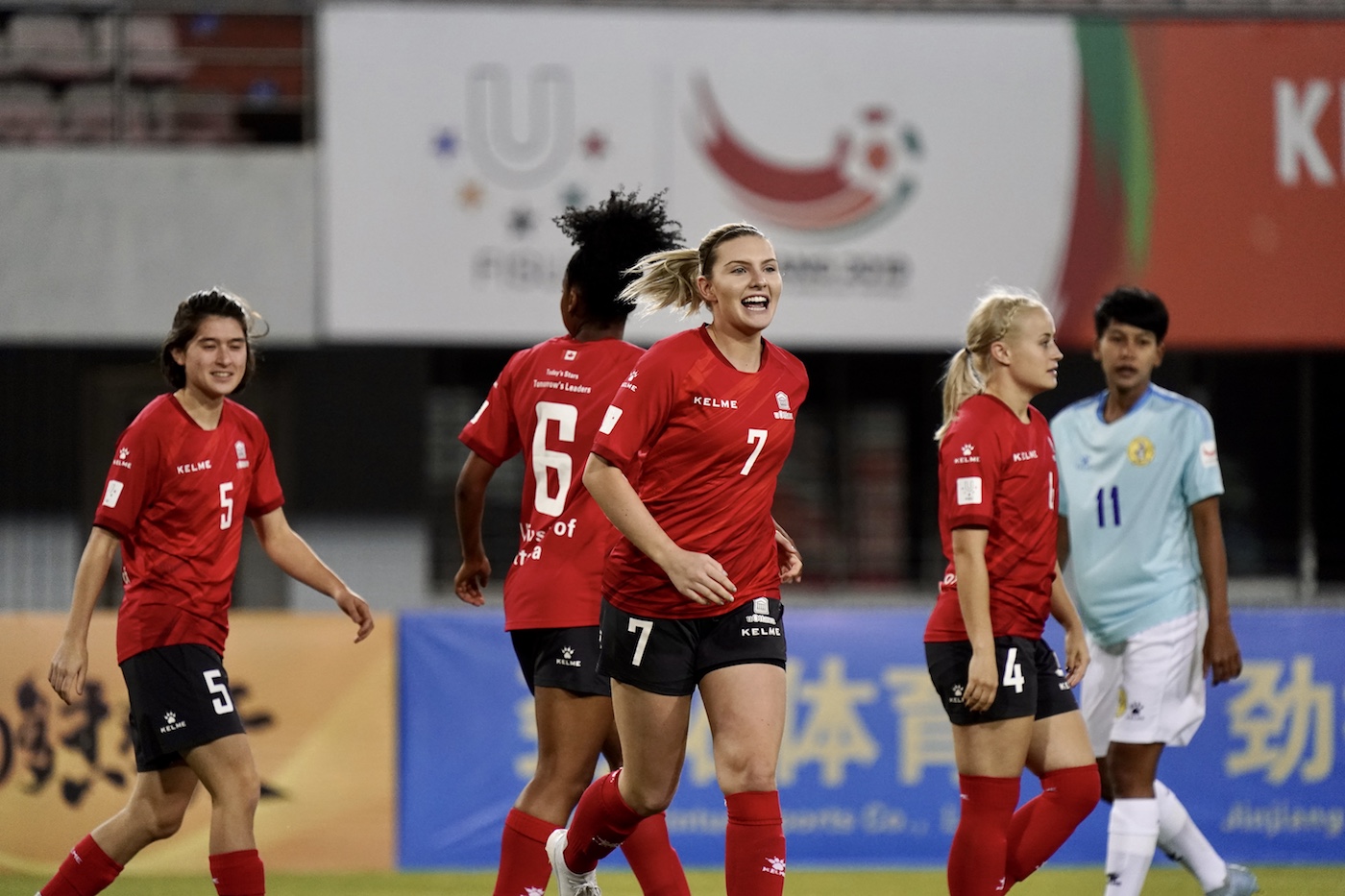 They did not disappoint in the final either, beating Paulista University of Brazil 1-0 for the title.
They did not disappoint in the final either, beating Paulista University of Brazil 1-0 for the title.
After 11 days, 61 matches, and 206 goals scored, it finally came down to the University of Wollongong from Australia taking on the University of the Republic from Uruguay in the men’s grand finale that was played out in a packed Jinjiang Football Park Stadium before 7,500 spectators.
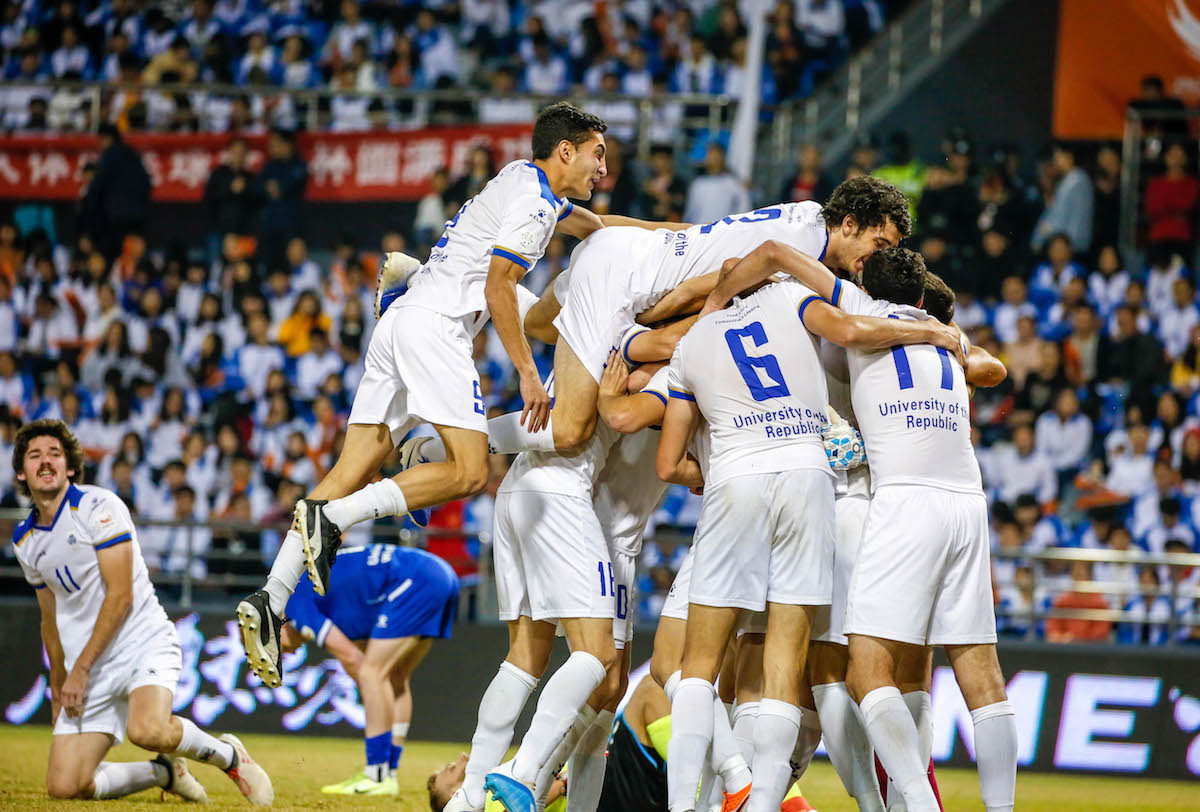 Befitting a grand finale, the match went 1-1 into halftime, then into full time and finally into 30 minutes extra time. The decisive moment came when University of the Republic’s captain Santiago Pallares Palomeque scored off a penalty kick just six minutes before the match would have gone into a shootout. It was enough for the title.
Befitting a grand finale, the match went 1-1 into halftime, then into full time and finally into 30 minutes extra time. The decisive moment came when University of the Republic’s captain Santiago Pallares Palomeque scored off a penalty kick just six minutes before the match would have gone into a shootout. It was enough for the title.
“I was trying to be as calm as possible in that moment because it was a decisive one,” the Player of the Tournament said after the victory. “I tried to bring myself into a calm state and get some power inside me.”
When the winning team was asked if the final was their toughest match of the tournament, Head Coach Alejandro Heguy Charamelo immediately said, “Yes, of course, a final is a final. In our country we say you don’t play a final, you only win a final!”
“Thank you to the people of Jinjiang for being so helpful and receptive to us,” he added. “The people here were truly amazing.”
The FISU University World Cup – Football returns to Jinjiang in 2021. Until then, an action-packed 2020 World University Season beckons, with 29 events dotted through the year starting March and ending in late November. The year 2020 will also see the sixth edition of the University World Cup 3×3, the FISU Forum in August that will be held in Budapest, Hungary, and the fourth FISU Volunteer Leaders Academy in Kazan, Russian Federation that will yet again bring together hundreds of future leaders from around the world.
At the International University Sports Federation, excitement never stops.
